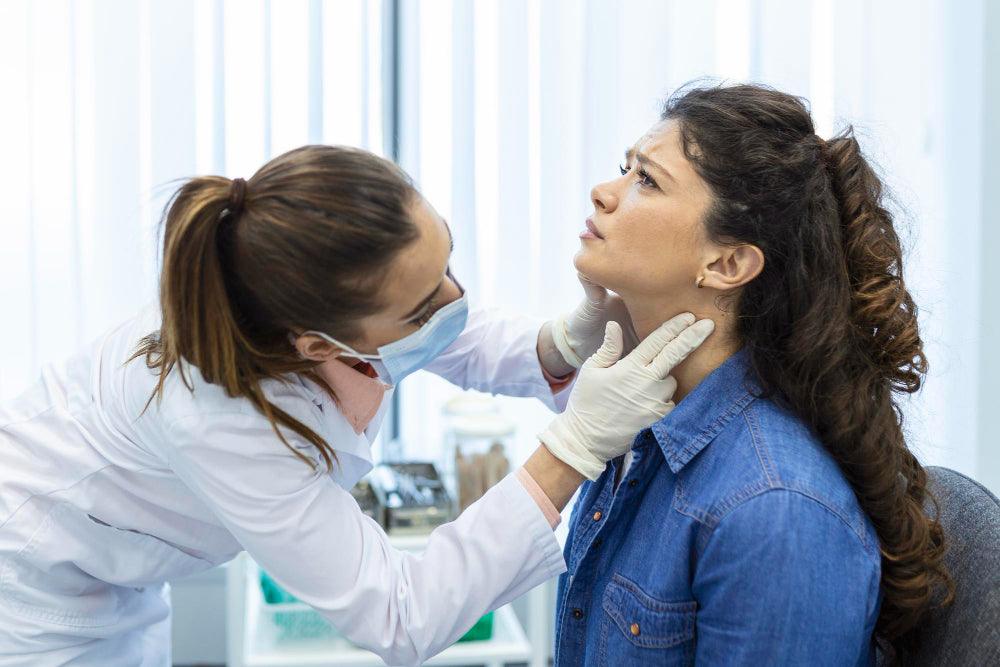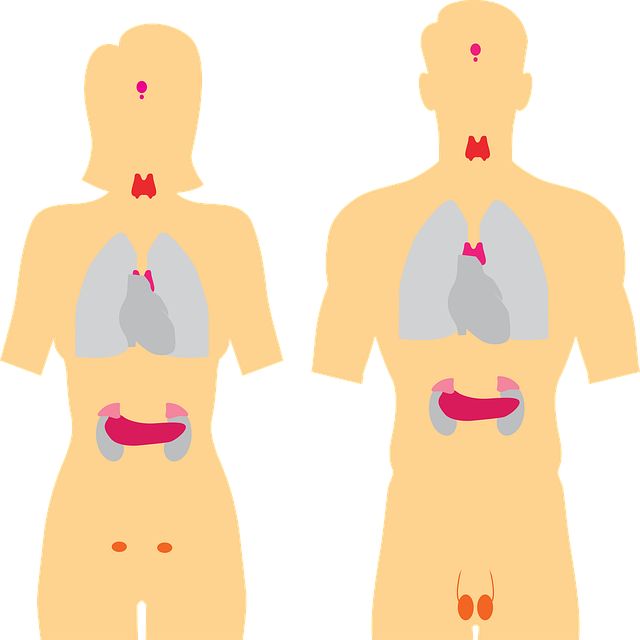What is hypothyroidism?


Hypothyroidism changes our body in several ways. These changes include constipation, fatigue, slow heart rate, depression, hair loss, anaemia and other symptoms. It is thus essential to keep the thyroid hormone in the normal range to normalise these changes
Hyperthyroidism is an illness that occurs when thyroid hormones are not produced properly. It is also understood by many people with thyroid issues that it causes a slow-motion metabolic response in their blood, which can cause problems with the blood sugar levels. Despite these estimates, 2% of the United Kingdom population suffer from Hypothyroidism. According to the National Institute for Health and Care Excellence, its prevalence is very high in women: approximately 5% of those over 60 have thyroid problems. Many UK citizens are at risk for hypothyroidism but are unaware. Hypothyroidism is easily understandable, read on to find out more.

Hypothyroidism is an endocrine disorder where the thyroid gland does not produce adequate thyroid hormones to meet the body's needs. It is a common condition, affecting over 5% of the population in the world. Thyroid hormones are T3 and T4 in our bloodstream, which control and regulate almost all functions of our body, ranging from metabolism, energy, body weight, and temperature to hormone control. The thyroid gland is regulated by a pituitary hormone called thyroid-stimulating hormone (TSH). The deficiency of pituitary TSH can cause hypothyroidism. This may be due to resection of the thyroid gland.
The contents of this article will briefly talk about every aspect of hypothyroidism.
The thyroid gland is located in front of the trachea below the chin. It consists of thyroid follicular cells, which are responsible for the production of T3 and T4. It is controlled and regulated by the pituitary hormone (TSH). When there is a deficiency of T3 and T4 in the blood, the pituitary hormone sends TSH to stimulate the thyroid gland's follicular cells, which results in the release of T3 and T4. T4 is converted into an active T3 form and performs different functions in our body. Any disruption in this activity leads to a decrease in thyroid hormone level called hypothyroidism.
Hypothyroidism can influence almost all groups of people, but people over age 55 are affected the most. However, it is more common in women than men.
Hashimoto thyroiditis is considered the primary cause of hypothyroidism. In this condition, inflammation of the follicular cells occurs, resulting in decreased thyroid hormone production. Sometimes, the thyroid gland is enlarged due to autoimmune reactions or iodine deficiency. This enlargement of the thyroid gland is called goitre. It can also cause hypothyroidism. Radiation therapy (to the head, neck, chest, and shoulders) can destroy the thyroid gland and leads to hypothyroidism. Some drugs like amiodarone can also cause hypothyroidism for short periods. For example, hypothyroidism was diagnosed in 20% of patients who received amiodarone. Other causes include pregnancy, malignancy, chemotherapy, and hepatitis.
Most common causes for hypothyroidism include Hashimoto's thyroiditis. Thyroiditis is an inflammation of the thyroid glands. This results in an autoimmune thyroid disease where your immune system attacks toxins from the thyroid which cause you to develop autoimmune symptoms.
Hypothyroidism can sometimes result from viral infections. The causes for the hypothyroid syndrome are: Primary hypothyroidism, which occurs when there is an imbalance within the thyroid gland itself, and Secondary hypothyroidism, which occurs when a third disorder is inhibited by thyroid toxicity. Similarly, the pituitary gland and the hypothalamus produce hormones that stimulate thyroid hormones.
Syndromes related to hypothyroidism are carpal tunnel syndrome, Raynaud syndrome, Sjogren syndrome, and Addison disease.
The symptoms of hypothyroidism can vary widely according to the severity or duration of thyroid dysfunction and when thyroid hormone levels have dropped. Symptoms also differ between people. Some patients have varying symptoms and in certain situations hypothyroidism doesn't have an effect at first.
More common symptoms include weakness, stress, weight changes (mostly weight gain), head pain, cold intolerance, muscle pain, dry skin, hair loss, thin hair and constipation. Other physical signs and symptoms include slow heartbeat (Bradycardia), high blood pressure, thin nails, oedema of the feet, yellow skin, and slow tendon reflex.
Less commonly, patients can also experience loss of appetite, voice hoarseness, and decreased taste. Female patients also have increased bleeding during their menstrual cycle.
A thyroid function test should be performed for patients having signs and symptoms of hypothyroidism. Initially, the blood TSH level is elevated while T4 is decreased. The reference range for TSH is generally 0.5 to 4.1 m-units/L. Other laboratory findings can include decreased levels of sodium, low blood glucose, and anaemia. Cholesterol can also rise in the blood.
Apart from laboratory tests, radiography is also performed to know the status of the thyroid gland. It is mainly obtained when the gland is enlarged in size. It includes a CT scan, MRI, and neck ultrasound. In some cases, pathological examination of follicular cells is also required.
Hypothyroidism is often detected simply by using a simple test - the thyroid hormone panel. It measures thyroid hormone levels. The normal range of thyroid hormone is calculated using computer algorithms; this hormone has already taken place in thousands of human populations. When thyroid hormones drop below normal range, it's an indication for hypothyroidism. The most common diagnosis and treatment of hypothyroidism by done an endocrinologist. .
When someone is having hypothyroidism, the doctor may order a blood test. The following can be examples of low T4 levels in humans that indicate hypothyroidism. However, some people can have increased TSH while maintaining normal TS4. Subclinical mild hypothyroidism occurs when the onset and symptoms have been identified in the early stages of hypothyroidism. The thyroid can cause a thyroid abnormality when it has no nodule or bleeding.
Your doctor will check your health history to make an examination. Hypothyroid disease can be determined solely by symptoms as its symptoms often overlap with other illnesses. Your physician will also use imaging or thyroid testing to determine the diagnosis.
Although hypothyroidism is generally a simple blood test to identify, millions of people can develop this condition in mild or moderate form. This patient's situation may be complex because it has a variety of factors. It is important to recognise that not all patients have hypothyroidism. The disorder can be severe or mild. Furthermore and most important, it is impossible to predict the symptoms of thyroid hormones just by analysing thyroid levels.
Myxedema crisis is considered the life-threatening completion of hypothyroidism. The crisis occurs spontaneously due to prolonged exposure to cold, which leads to hypothermia. It primarily affects aged female patients. The patients experience confusion, and the brain may be affected due to prolonged hypothermia. The cardiac muscles enlarge, and fluid effusion may occur in the cardiac membrane. This condition has a high death rate.
Levothyroxine is given intravenously for treatment.
a. Lungs pneumonia
b. Delusion
c. Adrenal crisis
d. Infertility
If left to its own devices, hyperthyroidism can develop quickly. This is accompanied by complications. For example, pregnancy, infertility, elevated LDL cholesterol and depression. Rarely can untreated hypothyroidism lead to traumatic brain injuries or traumatic coma - myxedema coma.

Hypothyroidism can influence the menstrual cycle and ovulation. In female patients with hypothyroidism, the ovulation process produces eggs less frequently than in healthy patients. Hypothyroidism can affect the growth and development of an embryo. This is because the embryo depends on the thyroid hormone for blood and nutrition supply. Therefore, the deficiency of the thyroid hormone can interfere with the foetus's blood supply.
Untreated hypothyroidism may be a dangerous side effect of pregnancy for the child or the mother. Nevertheless, thyroid drugs have been shown to prevent health problems, and can safely be used while a woman is pregnant. Many people who take Thyroid Medicine require higher levels in pregnancy so you should get to your doctor immediately after you discover you are pregnant.
Before forwarding to any type of treatment therapy, the patient requires clinical evaluation for adrenal crisis and heart disease.
Levothyroxine is considered the first line of treatment for treating hypothyroid patients. It is synthetically prepared; however, some doctors prescribed a combination of Levothyroxine and T3 for some patients. A young adult may be treated with this medicine in doses of 30-70mcg orally daily. The dosage can be increased as per the response of the patient. A smaller dosage of Levothyroxine is prescribed for patients with coronary heart disease. In coronary heart disease, the drug may cause cardiac complications.
The patient with a Myxedema crisis requires a higher dosage of Levothyroxine medicine. This is because the Myxedema crisis interferes with the absorption of Levothyroxine and decreases its availability in the blood. In such conditions, 500 mcg of Levothyroxine is given orally to increase the availability of the drug. Regular monitoring of Levothyroxine is crucial to determine the optimal dose of the drug.
In hypothyroid cases, the physician may prescribe a synthetic thyroid hormone. It can help with your weight management. Other medicines inhibit the synthesis of thyroid hormone. Make sure your doctor has the proper information about any medication you take. Your thyroid gland will be tested regularly. You may have to modify your medication dosage slightly. There is some time required to determine the right dose for thyroid hormone.
Patients, who have mild to moderate hypothermia, have a remission rate of 15%. Levothyroxine can help to treat about 15% of hypothyroid patients. However, the mortality rate is 90% in those patients who develop into Myxedema crisis after hypothyroidism.
Hypothyroid patients may require ventilation when he/she develops into a Myxedema crisis or hypercapnia.
At Welzo we offer a Thyroid Blood Test, which is able to measure hypothyroidism.
For a full range of blood tests and medications, visit our Welzo Online Pharmacy Page.








Plus get the inside scoop on our latest content and updates in our monthly newsletter.